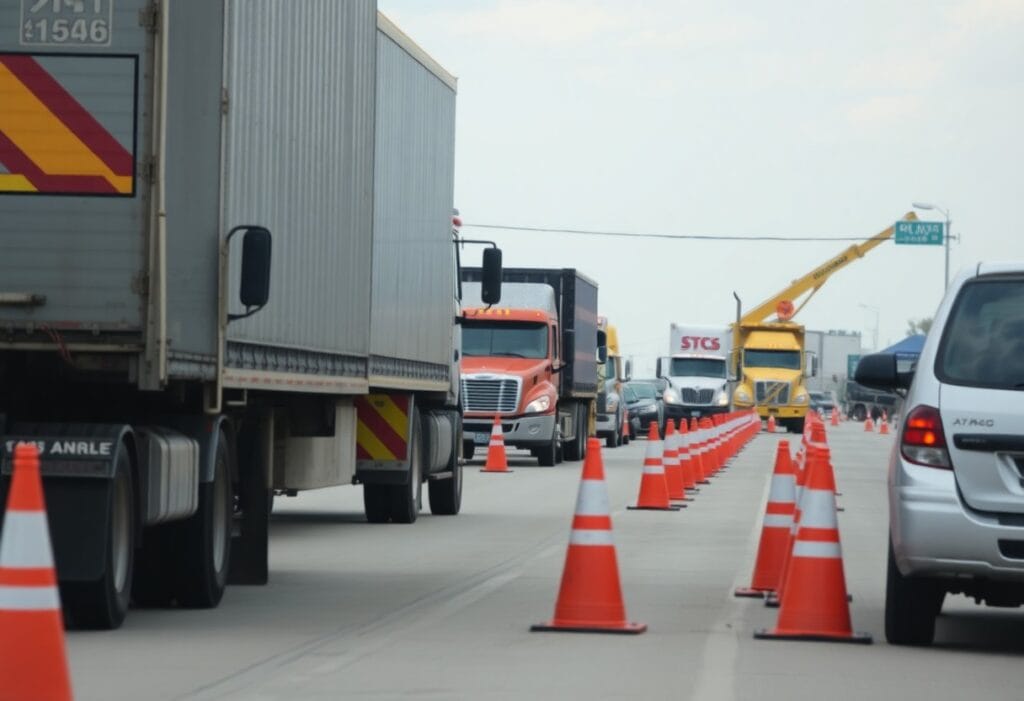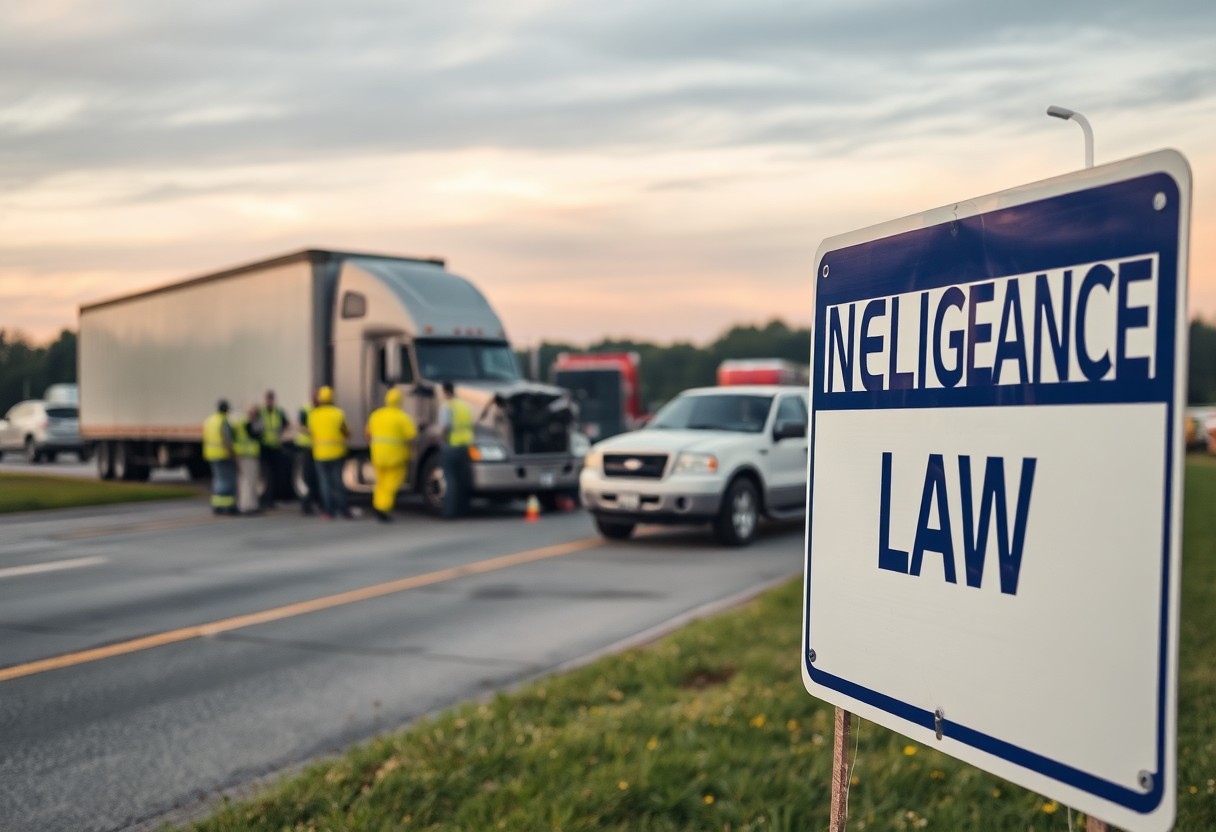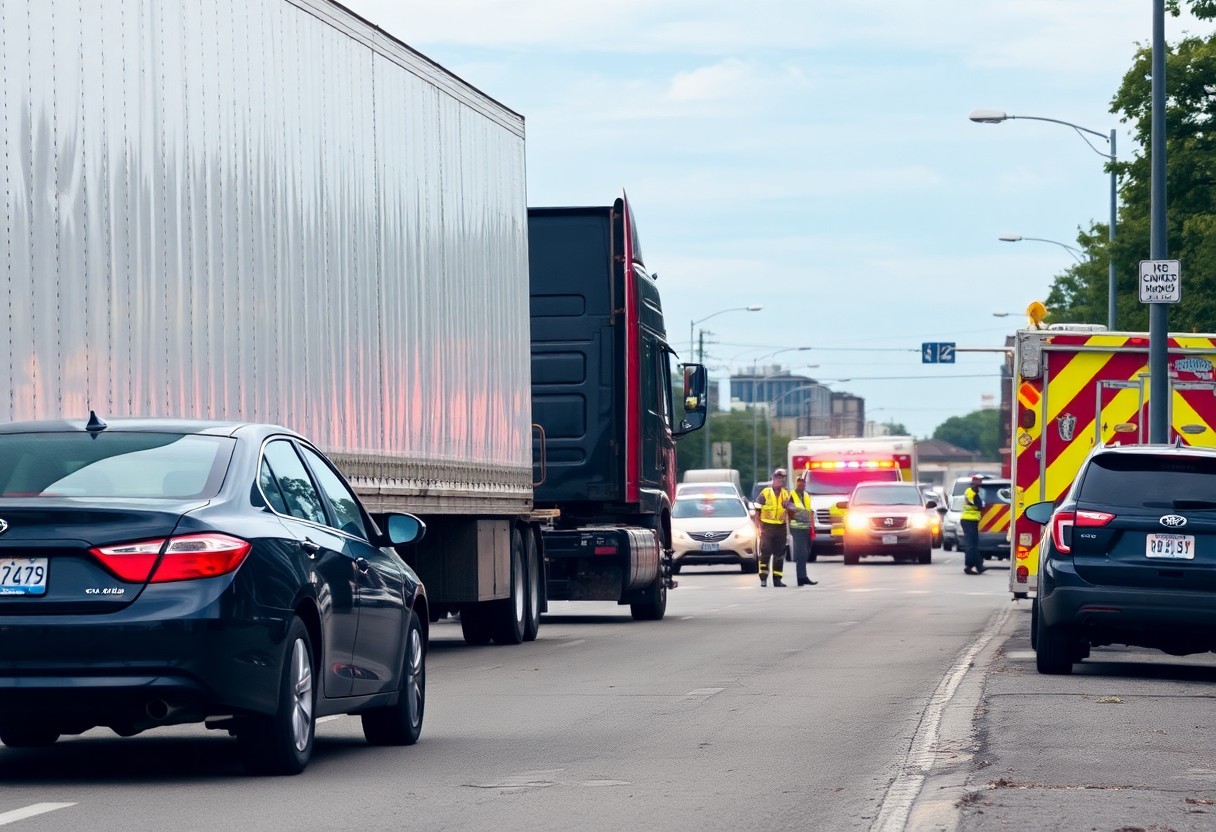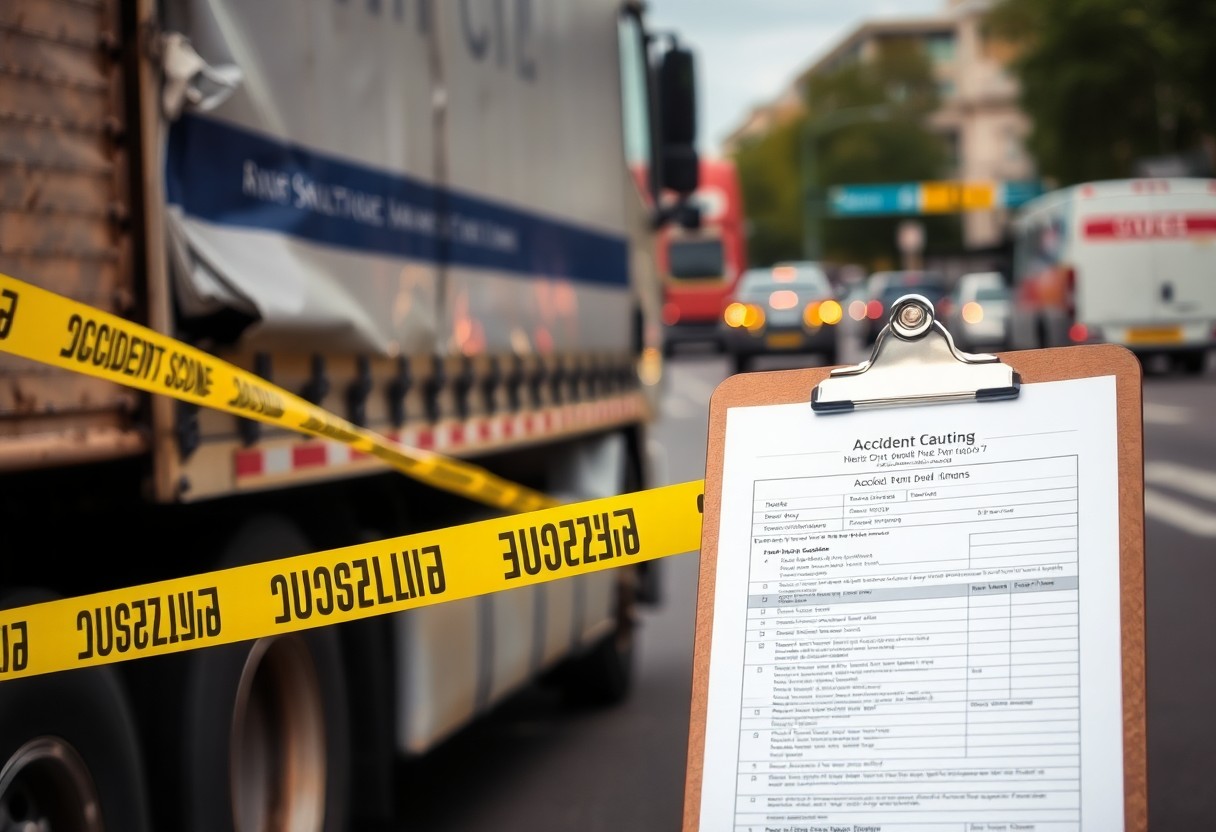Just as you navigate through the bustling streets of Jacksonville, you’ll likely encounter construction zones that can significantly impact truck traffic. These zones not only disrupt your daily commute but also affect delivery schedules and increase the chances of traffic delays, leading to potential hazards on the road. Understanding how these construction sites influence truck movement is vital for both drivers and logistics companies alike. In this post, we’ll explore these effects and give you tips on how to adapt your driving habits to ensure safety and efficiency.
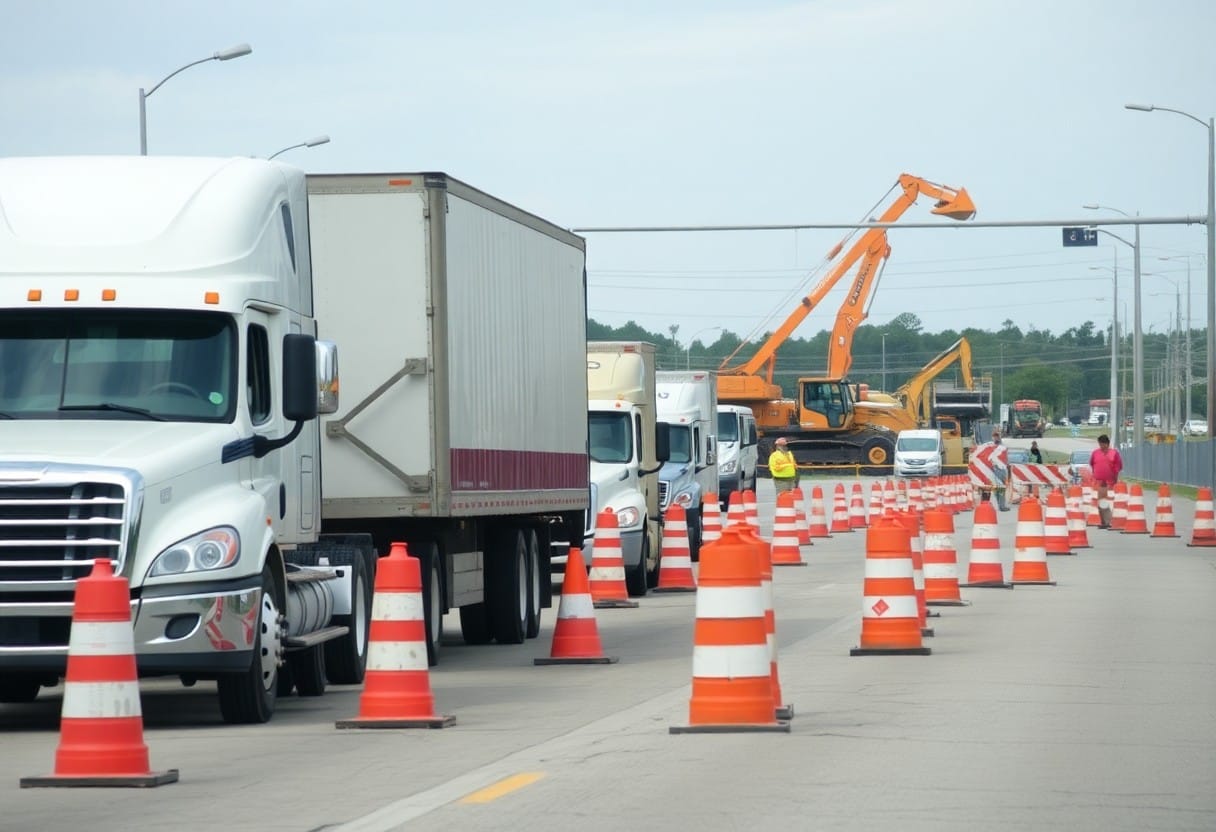
Overview of Truck Traffic in Jacksonville
A significant portion of Jacksonville’s economy relies on truck transportation, making it a vital component of daily operations for many businesses. The city’s strategic location near major highways and ports facilitates smooth logistics, but this also leads to heightened truck traffic congestion, particularly during peak hours and construction phases. You will find that understanding the dynamics of truck traffic here is important for navigating the roads effectively.
Current Traffic Patterns
The traffic patterns in Jacksonville show a consistent trend of increased truck movement, especially during weekdays. Key routes are often congested due to a combination of commercial and residential traffic, which can result in delays for both trucks and personal vehicles. You may notice that specific intersections pose challenges, impacting overall travel times.
Key Routes for Truck Transportation
Before identifying the specific routes utilized for truck transportation, it’s vital to grasp the network’s layout. Jacksonville boasts important highways like I-95 and I-10, which serve as major arteries for freight movement. These routes efficiently connect you to various destinations, but they are often extensively traveled, which can create traffic bottlenecks and delays.
With I-95 running north-south through Jacksonville and I-10 stretching west to east, these highways are integral to your logistics operations. Other key routes include US-1 and US-17, which provide access to local businesses and industrial parks. However, you must be aware that heavy traffic, especially during rush hours and construction projects, can lead to dangerous conditions and increased travel times. Prioritizing alternative routes or adjusting your schedules may enhance efficiency and safety when navigating these critical transportation corridors.
Impact of Construction Zones on Traffic Flow
Some of the most significant challenges you may encounter in Jacksonville, AL, are related to construction zones, which can significantly disrupt traffic flow. As you navigate through these areas, expect changes that directly affect your travel times, especially if you’re driving a truck. These construction sites often transform familiar routes into complicated detours, resulting in delays and increased frustration.
Lane Closures and Detours
Lane closures are a common feature of construction zones that can reroute your typical driving patterns. When lanes are blocked, truck drivers like you may find themselves relying on detours that can be longer or unfamiliar. As you adjust to these changes, it’s necessary to stay informed about available routes and to plan your travels accordingly.
Delays and Congestion Issues
One of the most frustrating aspects of construction zones is the potential for significant delays and congestion. Your truck’s size and weight can further exacerbate these problems, particularly in areas where traffic is already bottlenecked.
For instance, during peak hours, the combination of lane reductions and ongoing construction work can lead to extensive traffic jams that not only affect your schedule but also increase the likelihood of accidents. Being stuck in lengthy backups can elevate your stress and detract from the efficiency of your journey. To navigate these situations effectively, consider checking for real-time traffic updates and using navigation tools that provide alternative routes, ensuring a safer and more efficient trip through Jacksonville’s construction zones.
Safety Concerns in Construction Areas
Assuming you drive through construction zones in Jacksonville, it’s vital to be aware of heightened safety concerns. These areas often indicate changing traffic patterns, reduced visibility, and unpredictable behaviors from both drivers and pedestrians. With heavy machinery and narrow lanes, your attention is paramount to navigating these zones safely. Proper awareness can significantly reduce the risk of accidents and ensure both your safety and that of others on the road.
Increased Risk of Accidents
One of the most pressing issues in construction areas is the increased risk of accidents. With altered road layouts, construction debris, and unexpected stops, even experienced drivers need to exercise caution. To stay safe, keep a safe distance from other vehicles and avoid distractions while driving through these zones.
Impact on Pedestrian Safety
Pedestrian safety is often compromised in construction zones, creating potential hazards for individuals on foot. You may encounter narrow sidewalks, obstructed crosswalks, and erratic traffic patterns, all of which elevate the danger for pedestrians. Construction sites can unintentionally create environments where pedestrians are less visible, emphasizing the need for vigilance.
Increased awareness of your surroundings is vital for protecting pedestrian safety. Construction zones often lead to disrupted pedestrian pathways or temporary detours, which can cause confusion. When navigating these areas, ensure you watch for pedestrians who may be trying to cross in safe spots or may be impacted by redirected traffic. Your proactive approach can help mitigate risks and maintain a safer environment for everyone.
Economic Effects on Local Businesses
For many local businesses in Jacksonville, Alabama, construction zones can prompt significant economic challenges. The disruption of normal traffic flow often leads to decreased customer traffic, impacting sales and revenue. Additionally, local businesses face increased costs due to delays in deliveries and logistical complications, which can strain your operations and bottom line.
Delivery Schedule Disruptions
By navigating through construction zones, delivery trucks often experience unexpected delays. This can lead to missed delivery windows, impacting your inventory levels and operational efficiency. As a result, you may find it necessary to adjust your scheduling and order planning to accommodate these disruptions.
Changes in Customer Accessibility
With construction zones blocking certain routes, your customers may find it more challenging to reach your business. These obstacles can deter foot traffic and create frustration, ultimately affecting your sales. You might notice a decline in repeat customers if they can’t easily access your location.
Changes in customer accessibility can have a profound effect on your business’s visibility and attractiveness. When routes are blocked, your customers face increased difficulty in reaching your establishment, leading to a potential drop in customer footfall. If alternative access points aren’t clear or well-signposted, customers may choose to shop elsewhere, resulting in lost revenue. It’s vital to keep your customers informed about access issues and perhaps consider promotions or incentives to encourage their visits despite the challenges.
Mitigation Strategies
To effectively address the impact of construction zones on truck traffic in Jacksonville, implementing mitigation strategies is crucial. These strategies aim to minimize delays, enhance safety, and ensure smoother traffic flow, making it easier for you and other drivers to navigate through construction zones.
Planning and Communication
Mitigation efforts begin with diligent planning and communication among all stakeholders involved. By coordinating schedules and informing the public about upcoming construction projects, you can better prepare for potential delays and choose alternate routes, ultimately reducing frustration during your travels.
Use of Technology in Traffic Management
Above all, leveraging technology is key to efficient traffic management in construction zones. Utilizing real-time data and smart traffic signals can significantly improve traffic flow, allowing you to navigate construction areas safely and swiftly.
Technology integration, such as GPS-based traffic apps and real-time monitoring systems, keeps you informed about current traffic conditions and any construction developments. By receiving timely updates, you can adapt your route to avoid congested areas, therefore enhancing your driving experience. Additionally, advanced traffic lights can be programmed to prioritize truck movements, ensuring safer and more streamlined transitions through work zones while reducing the likelihood of accidents. This proactive approach not only benefits your travel efficiency but also contributes to overall road safety.
Future Outlook for Truck Traffic and Construction
Keep in mind that as Jacksonville continues its growth, the dynamic between truck traffic and construction activities will evolve. With ongoing projects expected to improve infrastructure, you can anticipate changes that may enhance the efficiency of freight movement while simultaneously posing new challenges.
Anticipated Infrastructure Projects
Future infrastructure projects in Jacksonville aim to modernize transport routes and accommodate increased truck traffic. These developments are expected to alleviate congestion in key areas, resulting in an improved flow of goods and services throughout the region.
Long-term Solutions and Adjustments
Below are options that the city may consider to enhance truck traffic management amid ongoing construction. These include better planning and scheduling of roadworks, improved signage, and increasing communication with trucking companies.
But implementing long-term solutions requires collaboration among contractors, local authorities, and truck companies. You may see innovative approaches such as dedicated truck lanes that minimize interference with construction zones, and coordinated work schedules that align with peak traffic times. By investing in technological enhancements, Jacksonville can improve transportation efficiency, reduce accident risks, and ultimately create a safer driving environment for all road users.
Summing up
To wrap up, understanding how construction zones impact truck traffic in Jacksonville, AL, can help you navigate through the area more efficiently. You may encounter delays, detours, and increased congestion as construction projects progress, so staying informed about current road conditions can enhance your travel experience. Keeping an eye on local traffic updates and planning your routes ahead of time can aid in avoiding potential inconveniences caused by these construction zones. Your attention to these factors plays a significant role in ensuring smoother logistics and timely deliveries.


